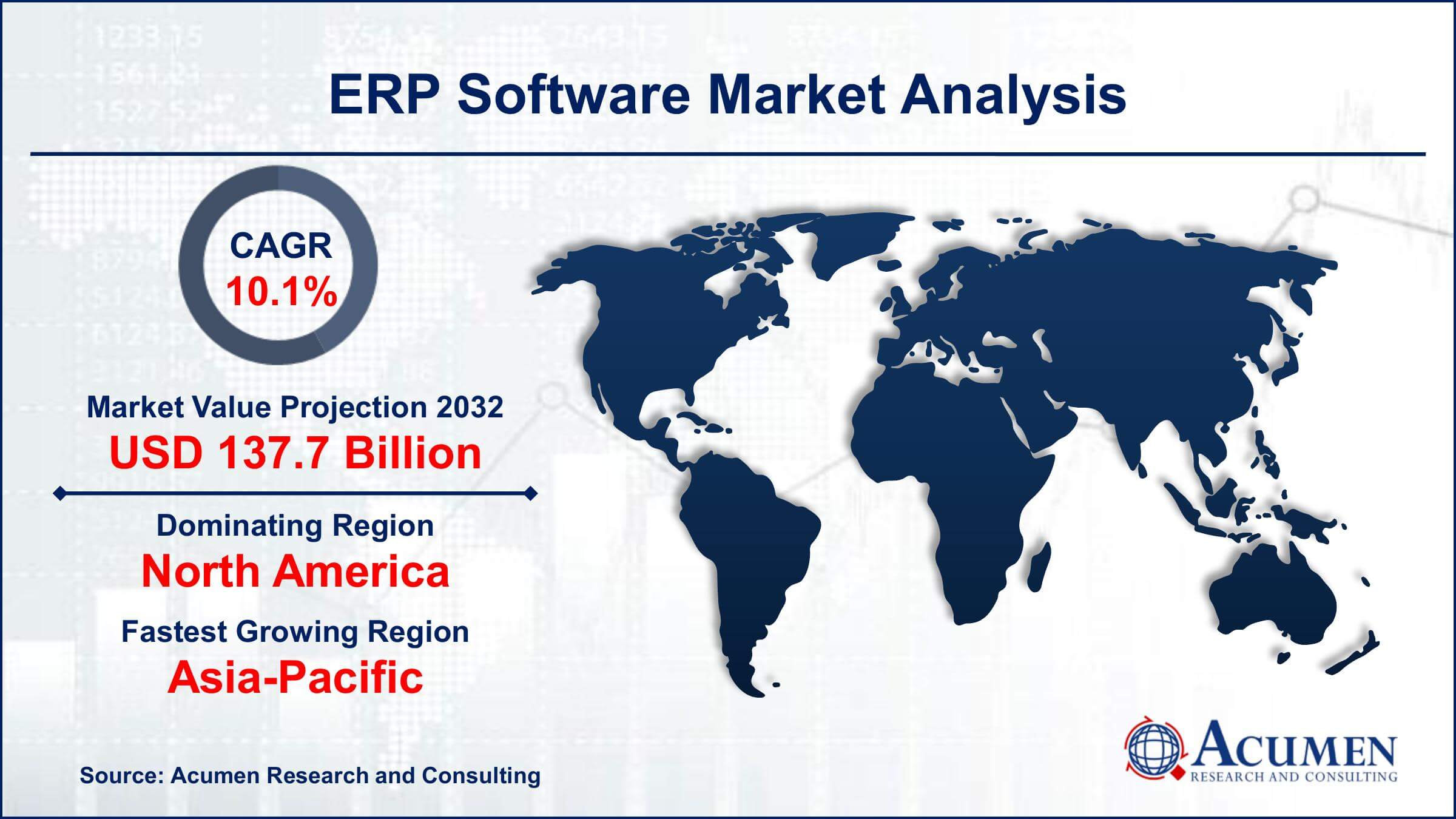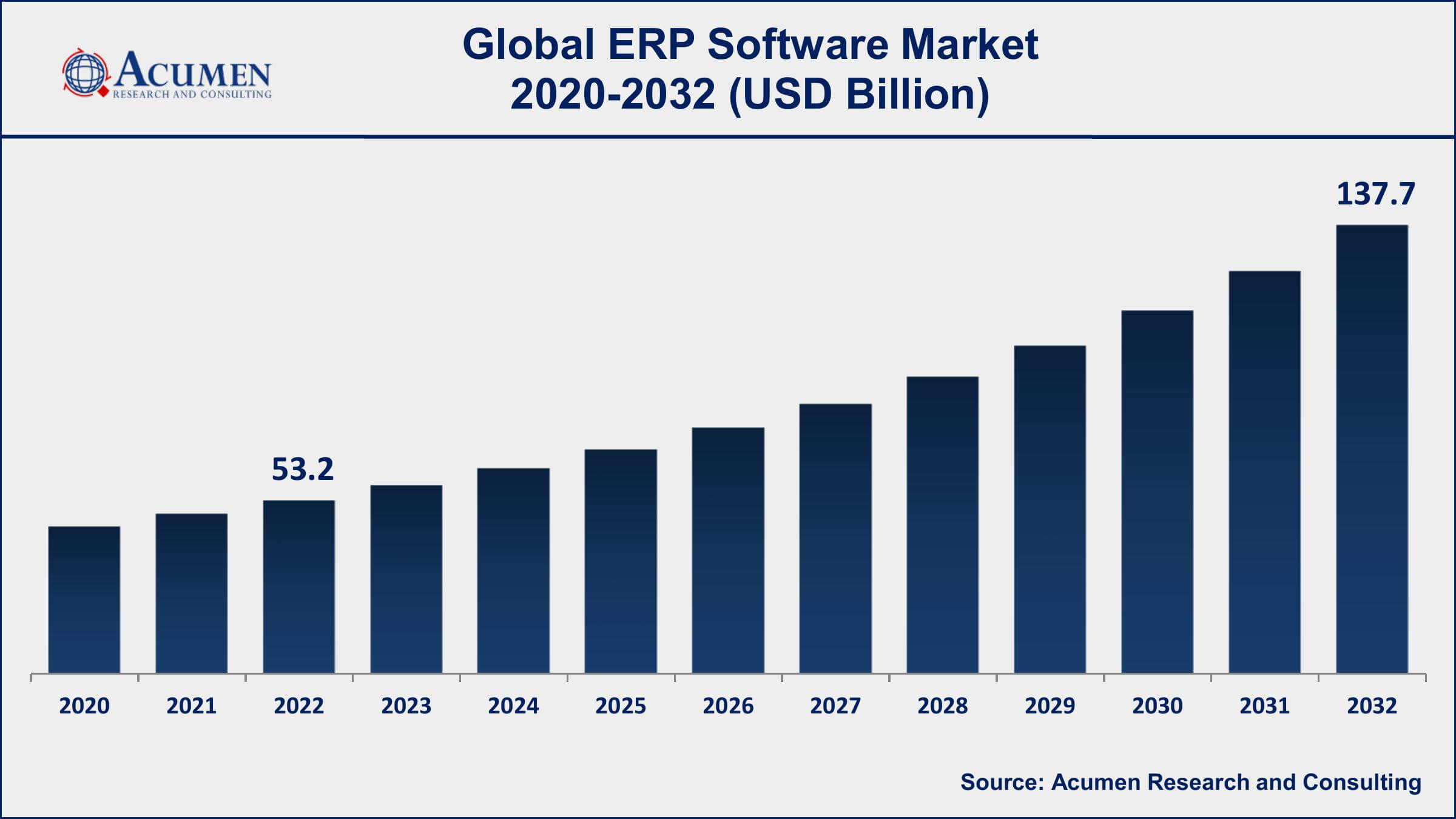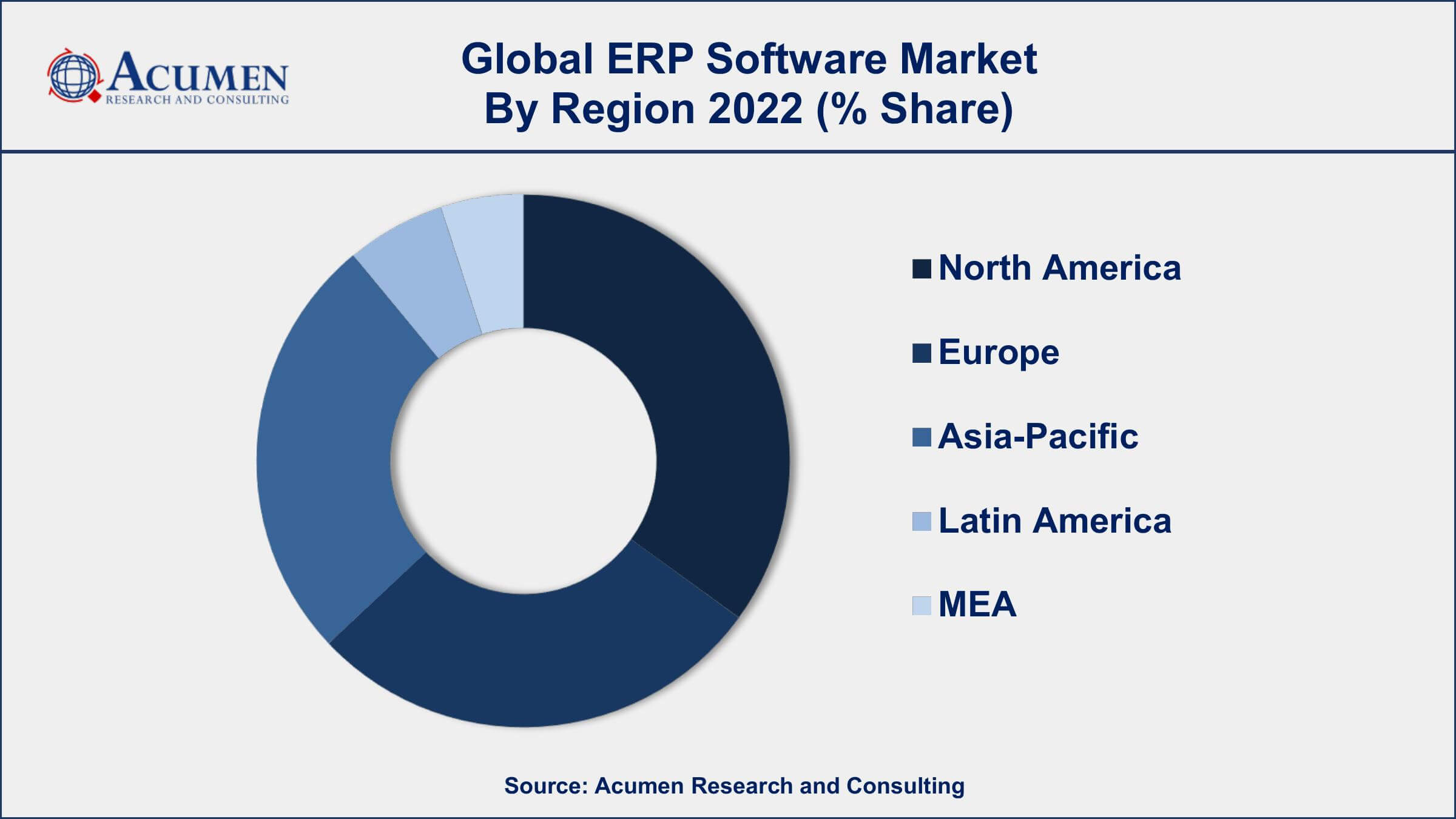ERP Software Market Size - Global Industry, Share, Analysis, Trends and Forecast 2023 - 2032
Published :
Report ID:
Pages :
Format :
ERP Software Market Size - Global Industry, Share, Analysis, Trends and Forecast 2023 - 2032
Report Coverage
- Industry Dynamics
- Market Size and Forecast Data
- Segment Analysis
- Competitive Landscape
- Regional Analysis with a Niche Focus on Country-Level Data
- High Level Analysis - Porter's, PESTEL, Value Chain, etc.
- Company Profiles of Key Players
- Option to Customize the Report As Per Your Specific Need
Request Sample Report
The Global Enterprise Resource Planning (ERP) Software Market Size accounted for USD 53.2 Billion in 2022 and is projected to achieve a market size of USD 137.7 Billion by 2032 growing at a CAGR of 10.1% from 2023 to 2032.
ERP Software Market Highlights
- Global ERP software market revenue is expected to increase by USD 137.7 Billion by 2032, with a 10.1% CAGR from 2023 to 2032
- North America region led with more than 35% of ERP software market share in 2022
- Asia-Pacific ERP software market growth will record a CAGR of around 11.7% from 2023 to 2032
- By business function, the financial management segment has accounted more than 27% of the revenue share in 2022
- By enterprise type, the SMEs segment is expected to expand at the biggest CAGR of 12% from 2023 to 2033
- Increasing need for process automation and efficiency in organizations, drives the ERP software market value

ERP (Enterprise Resource Planning) software is a comprehensive suite of integrated applications designed to streamline and automate business processes across various departments within an organization. It allows companies to manage and track core business functions such as finance, human resources, supply chain management, manufacturing, sales, and customer relationship management (CRM) from a centralized platform. ERP software facilitates the flow of information and promotes collaboration among different departments, enabling organizations to make data-driven decisions, improve operational efficiency, and enhance overall productivity.
The market for ERP software has experienced significant growth over the years, driven by the increasing need for businesses to optimize their operations and gain a competitive edge. The deployment of ERP systems has become essential for companies of all sizes and across various industries, including manufacturing, retail, healthcare, finance, and services. ERP software offers numerous benefits, such as improved process efficiency, better inventory management, enhanced customer service, reduced operational costs, and increased scalability.

Global ERP Software Market Trends
Market Drivers
- Increasing need for process automation and efficiency in organizations
- Growing demand for integrated and centralized data management systems
- Adoption of cloud-based ERP solutions, offering scalability, flexibility, and cost-effectiveness
- Rising focus on digital transformation and modernization of business processes
- Expansion of ERP functionality to include advanced technologies such as AI, ML, and IoT
Market Restraints
- High implementation and maintenance costs, particularly for large-scale enterprises
- Complex implementation process, requiring significant time and resources
Market Opportunities
- Small and medium-sized enterprises (SMEs) embracing ERP solutions for business optimization
- Integration of ERP with emerging technologies like blockchain, edge computing, and augmented reality
ERP Software Market Report Coverage
| Market | ERP Software Market |
| ERP Software Market Size 2022 | USD 53.2 Billion |
| ERP Software Market Forecast 2032 | USD 137.7 Billion |
| ERP Software Market CAGR During 2023 - 2032 | 10.1% |
| ERP Software Market Analysis Period | 2020 - 2032 |
| ERP Software Market Base Year | 2022 |
| ERP Software Market Forecast Data | 2023 - 2032 |
| Segments Covered | By Enterprise Type, By Deployment, By Business Function, By End-user, And By Geography |
| Regional Scope | North America, Europe, Asia Pacific, Latin America, and Middle East & Africa |
| Key Companies Profiled | SAP SE, Oracle Corporation, Microsoft Corporation, Infor, Epicor Software Corporation, Sage Group PLC, IFS AB, Plex Systems, Inc., Workday, Inc., Unit4, Syspro, and Acumatica. |
| Report Coverage |
Market Trends, Drivers, Restraints, Competitive Analysis, Player Profiling, Covid-19 Analysis, Regulation Analysis |
ERP (Enterprise Resource Planning) software is a comprehensive suite of integrated applications designed to streamline and automate business processes across various departments within an organization. It serves as a centralized platform that allows companies to manage and track core business functions such as finance, human resources, supply chain management, manufacturing, sales, and customer relationship management (CRM). ERP software enables efficient data flow, collaboration, and information sharing among different departments, providing a holistic view of the organization's operations.
The application of ERP software in businesses is extensive and covers a wide range of industries and functional areas. In finance, ERP software helps with financial planning, budgeting, accounting, and reporting, providing real-time visibility into financial data. In human resources, it facilitates employee management, recruitment, onboarding, training, and performance evaluation. For supply chain management, ERP software optimizes procurement, inventory management, demand forecasting, and logistics coordination. In manufacturing, it supports production planning, scheduling, quality control, and material management. ERP systems also enable efficient sales and CRM activities by managing customer data, tracking leads, and automating sales processes.
The ERP software market growth is primarily driven by the increasing need for organizations to streamline their business processes, enhance operational efficiency, and improve decision-making capabilities. The demand for ERP solutions has been rising across various industries, including manufacturing, retail, healthcare, finance, and services. One of the significant factors contributing to the market growth is the adoption of cloud-based ERP solutions. Cloud-based ERP offers benefits such as scalability, flexibility, reduced infrastructure costs, and improved accessibility to real-time data. With the growing acceptance of cloud technology, organizations are increasingly shifting from on-premises ERP systems to cloud-based solutions.
ERP Software Market Segmentation
The global ERP software market segmentation is based on enterprise type, deployment, business function, end-user, and geography.
ERP Software Market By Enterprise Type
- Large Enterprises
- Small & Medium Enterprises (SMEs)
According to the ERP software industry analysis, the large enterprises segment accounted for the largest market share in 2022. Large organizations across various industries have recognized the value of ERP systems in managing their complex operations and driving efficiency. As a result, they have been early adopters and significant contributors to the growth of the ERP software market. One of the key drivers for the adoption of ERP software by large enterprises is the need for centralized and integrated management of business processes. With multiple departments and divisions, large organizations often face challenges in coordinating and consolidating their operations. ERP software provides a unified platform that connects various functions such as finance, supply chain, manufacturing, human resources, and more. This integration enables seamless data flow, improved collaboration, and better decision-making across the organization.
ERP Software Market By Deployment
- Cloud
- Hybrid
- On-premise
In terms of deployments, the cloud segment is expected to witness significant growth in the coming years. Cloud-based ERP solutions offer numerous advantages over traditional on-premises systems, making them increasingly popular among organizations of all sizes, particularly small and medium-sized enterprises (SMEs). One of the key drivers of the growth in the cloud segment is the scalability and flexibility provided by cloud-based ERP solutions. Cloud ERP allows organizations to scale their software usage and storage based on their evolving needs, without the need for significant upfront investments in infrastructure. This flexibility enables businesses to adapt to changing market conditions, accommodate growth, and respond to new opportunities more efficiently.
ERP Software Market By Business Function
- Financial Management
- Supply Chain Management
- Human Capital Management
- Inventory & Work Order Management
- Customer Management
- Others
According to the ERP software market forecast, the inventory & work order management segment is expected to witness significant growth in the coming years. Efficient management of inventory and work orders is crucial for organizations across various industries to optimize their operations, reduce costs, and meet customer demands in a timely manner. Inventory management is a critical aspect of any business that deals with physical goods. ERP software offers advanced inventory management capabilities, including real-time tracking, demand forecasting, automatic reordering, and inventory optimization. These features help organizations maintain optimal inventory levels, minimize stockouts, reduce carrying costs, and improve overall supply chain efficiency. The growth in the inventory and work order management segment within the ERP software market is driven by the increasing need for organizations to optimize their operational processes, reduce costs, and deliver products and services efficiently.
ERP Software Market By End-user
- Manufacturing
- IT & Telecom
- BFSI
- Government
- Retail & Consumer Goods
- Transportation & Logistics
- Healthcare & Life Sciences
- Others
Based on the end-user, the manufacturing segment is expected to continue its growth trajectory in the coming years. Manufacturing organizations face unique challenges such as complex production processes, supply chain management, quality control, and inventory management. ERP software offers tailored solutions specifically designed to address these challenges and improve overall operational efficiency in the manufacturing industry. One of the primary factors driving the growth in the manufacturing segment is the need for integrated and streamlined processes. ERP systems provide end-to-end visibility and control over various manufacturing functions, including production planning, scheduling, materials management, shop floor control, and quality assurance. This integration enables manufacturers to optimize their operations, minimize production bottlenecks, reduce waste, and enhance overall productivity.
ERP Software Market Regional Outlook
North America
- U.S.
- Canada
Europe
- U.K.
- Germany
- France
- Spain
- Rest of Europe
Asia-Pacific
- India
- Japan
- China
- Australia
- South Korea
- Rest of Asia-Pacific
Latin America
- Brazil
- Mexico
- Rest of Latin America
The Middle East & Africa
- South Africa
- GCC Countries
- Rest of the Middle East & Africa (ME&A)

ERP Software Market Regional Analysis
North America dominates the ERP software market for several reasons, including its advanced technological infrastructure, strong economic presence, and high adoption rate of digital solutions among businesses in the region. One of the key factors contributing to North America's dominance is its well-established technological infrastructure. The region has a robust network infrastructure, high-speed internet connectivity, and advanced data centers, which are essential for the smooth implementation and operation of ERP systems. This technological advantage provides a strong foundation for businesses to leverage ERP software and drive digital transformation. Additionally, North America is home to many large enterprises across various industries, including manufacturing, retail, healthcare, and finance. These organizations have been early adopters of ERP software, recognizing its potential to streamline operations, enhance productivity, and gain a competitive edge. The presence of these industry leaders has created a ripple effect, as smaller businesses often follow suit, further fueling the demand for ERP solutions in the region.
ERP Software Market Player
Some of the top ERP software market companies offered in the professional report include SAP SE, Oracle Corporation, Microsoft Corporation, Infor, Epicor Software Corporation, Sage Group PLC, IFS AB, Plex Systems, Inc., Workday, Inc., Unit4, Syspro, and Acumatica.
Frequently Asked Questions
What was the market size of the global ERP software in 2022?
The market size of ERP software was USD 53.2 Billion in 2022.
What is the CAGR of the global ERP software market from 2023 to 2032?
The CAGR of ERP software is 14.5% during the analysis period of 2023 to 2032.
Which are the key players in the ERP software market?
The key players operating in the global market are including SAP SE, Oracle Corporation, Microsoft Corporation, Infor, Epicor Software Corporation, Sage Group PLC, IFS AB, Plex Systems, Inc., Workday, Inc., Unit4, Syspro, and Acumatica.
Which region dominated the global ERP software market share?
North America held the dominating position in ERP software industry during the analysis period of 2023 to 2032.
Which region registered fastest CAGR from 2023 to 2032?
Asia-Pacific region exhibited fastest growing CAGR for market of ERP software during the analysis period of 2023 to 2032.
What are the current trends and dynamics in the global ERP software industry?
The current trends and dynamics in the ERP software industry include increasing need for process automation and efficiency in organizations, growing demand for integrated and centralized data management systems, and rising focus on digital transformation and modernization of business processes.
Which deployment held the maximum share in 2022?
The cloud deployment held the maximum share of the ERP software industry.



